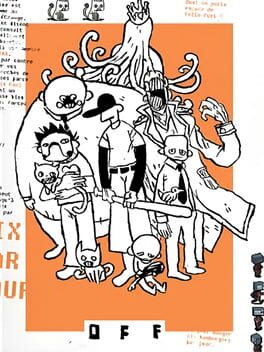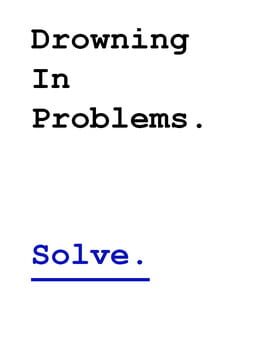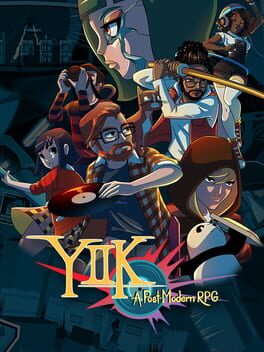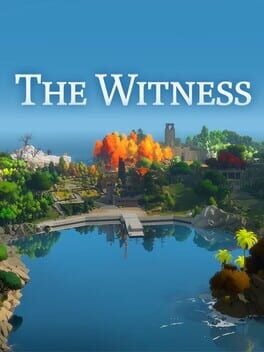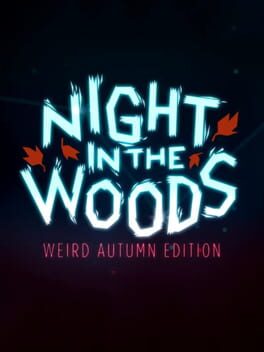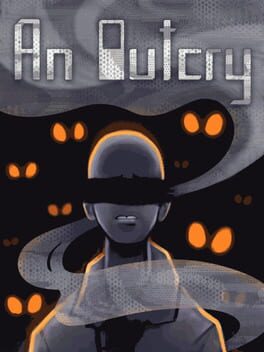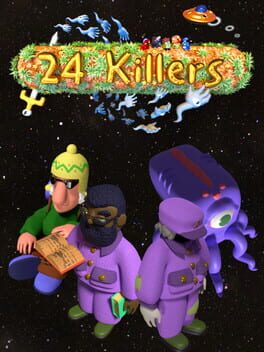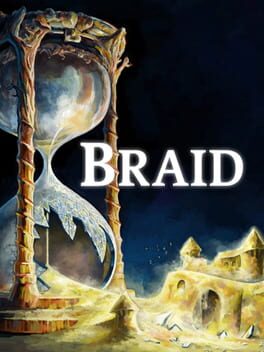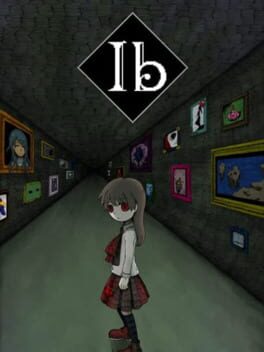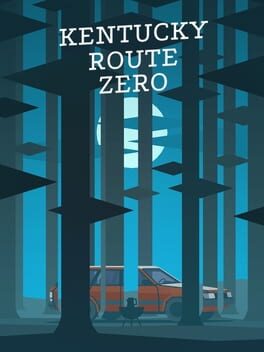QuinnK
2008
I'm biased on this one- I translated it to English. But, yes, OFF is good: A triumph of boundary-breaking aesthetic and off-beat narrative depth. A trailblazer in a few respects too, taking up condemnations of game violence as early as 2008.
Its puzzles are lovely notebook-and-pen riddles, with some hard nuts to crack; where it falters is its combat, which is at worst tedious and at best negligible once you've reached a high enough level.
Even so, this is one of the RPG Maker game greats of its day, and is still worth revisiting now.
Its puzzles are lovely notebook-and-pen riddles, with some hard nuts to crack; where it falters is its combat, which is at worst tedious and at best negligible once you've reached a high enough level.
Even so, this is one of the RPG Maker game greats of its day, and is still worth revisiting now.
2012
This review contains spoilers
you know what? fuck it. spec ops: the line is worth five stars and then some. for a long time i sat on the fence about it, and had it collecting dust, uncommentated, at 4.5 stars - no more.
the fact this game was shuffled out-of-sight by 2k games, that an attempt is being made to erase its existence from the public under dubious pretenses at worst, or that it's been dropped in a double-whammy of corporate greed and convenient timing at best, shows us that this game is just as sorely needed now as it was 12 years ago.
many like to do a little joking about its "look what i made you do"-narrative, but those people are unaware that this precise portrayal of leadership at the hands of a vague authority is part of the point. this is taking down not merely the modern military shooter alone, but the entirety of the military industrial complex and its implications. the game design here is a direct analogue of the military chain of command, and the way it attempts to dissuade individuals and society as a whole from seeking blame in the hands of the actor.
on february 25th 2024, united states airforce member aaron bushnell self-immolated rather than continuing to maintain part in the u.s. military's support of yet another genocide - a genocide funded and fueled by this global force for despicable violence, a genocide committed, in part, with white phosphorous used against a civilian population.
the timing is just a bit TOO on-the-nose. we are supposed to forget that the same thing fuels this propaganda as fuels the systematic dehumanisation and killing of several peoples in asia and africa. spec ops, unlike every single other "modern military shooter", didnt flinch, and didnt lie. and for that, it had to disappear.
this is the only game that had the guts to give the player a gun, and let them shoot at a peaceful civilian population - then stand there with the implications of their actions. no fade-out. no game over. only you and the simulacrum of a dead body.
from the river to the sea, palestine will be free.
the fact this game was shuffled out-of-sight by 2k games, that an attempt is being made to erase its existence from the public under dubious pretenses at worst, or that it's been dropped in a double-whammy of corporate greed and convenient timing at best, shows us that this game is just as sorely needed now as it was 12 years ago.
many like to do a little joking about its "look what i made you do"-narrative, but those people are unaware that this precise portrayal of leadership at the hands of a vague authority is part of the point. this is taking down not merely the modern military shooter alone, but the entirety of the military industrial complex and its implications. the game design here is a direct analogue of the military chain of command, and the way it attempts to dissuade individuals and society as a whole from seeking blame in the hands of the actor.
on february 25th 2024, united states airforce member aaron bushnell self-immolated rather than continuing to maintain part in the u.s. military's support of yet another genocide - a genocide funded and fueled by this global force for despicable violence, a genocide committed, in part, with white phosphorous used against a civilian population.
the timing is just a bit TOO on-the-nose. we are supposed to forget that the same thing fuels this propaganda as fuels the systematic dehumanisation and killing of several peoples in asia and africa. spec ops, unlike every single other "modern military shooter", didnt flinch, and didnt lie. and for that, it had to disappear.
this is the only game that had the guts to give the player a gun, and let them shoot at a peaceful civilian population - then stand there with the implications of their actions. no fade-out. no game over. only you and the simulacrum of a dead body.
from the river to the sea, palestine will be free.
2014
2013
In 2013, before such a thing as "media literacy" was in my repertoire, I played Bioshock Infinite. I walked into the game being excited from all the pre-release trailers and teasers and behind-the-scenes peeks - and the sad, sad reality is that most of what I had seen was not the game that I or anyone got, but sawdust on the floor, scraped from the rough surface of the featureless wooden plank that is now left.
I slogged through Bioshock Infinite. For 30 hours. I had my golden guns, and my pre-order bonuses, and I died against a ghost a bunch, and when it was over I woke up and felt nothing. In a last spark, started up the DLC I had also pre-ordered, and eventually quit, and didn't touch it again for 8 years.
Now here I am. I played about a third of the game as a refresher and- Now it's worse! This game is the most harrowing, violent dissociative psychosis I have ever played (barring Postal 2), hollow and subtly reprehensible. It is deeply disquieting to be in the body that plays this thing and was actively detrimental to my mental health.
I gave a small mercy-star on top of my desired half-star rating just for the art direction and for the poor, unfortunate souls that must have killed their careers trying to save this cluster car crash of a game. Do NOT play it. It was never good, and has only gotten worse.
I slogged through Bioshock Infinite. For 30 hours. I had my golden guns, and my pre-order bonuses, and I died against a ghost a bunch, and when it was over I woke up and felt nothing. In a last spark, started up the DLC I had also pre-ordered, and eventually quit, and didn't touch it again for 8 years.
Now here I am. I played about a third of the game as a refresher and- Now it's worse! This game is the most harrowing, violent dissociative psychosis I have ever played (barring Postal 2), hollow and subtly reprehensible. It is deeply disquieting to be in the body that plays this thing and was actively detrimental to my mental health.
I gave a small mercy-star on top of my desired half-star rating just for the art direction and for the poor, unfortunate souls that must have killed their careers trying to save this cluster car crash of a game. Do NOT play it. It was never good, and has only gotten worse.
Timeline of events:
I'm a games writer, and I was feeling bad about my work. I'm also a fan of postmodernist fiction. I thought: "Surely, comparing what I like and what I do to YIIK, a notoriously awful game, I'll feel better about myself." I bought it later, when it was on sale.
Now, I've played an hour and 9 minutes of it.
I did not know.
Even four years down the line, YIIK's developers do not understand... anything that makes a game coherent, and hold somebody's attention. We can't even talk about "good" here - this is not in the same star system as a "good" game.
At the start it's a thousand pinpricks. As it continues, they ramp up and turn into drills. And make no mistake: No video essay talking about it can make you understand how bad that feels to play.
Basic feedback for most player actions is absent; actions such as setting the Panda-barrier cannot be cancelled out of; the music meanders without skill or purpose; the graphical style has small inconsistencies and errors that would've been easily fixed, but never were; NPCs are either cardboard, or just the worst babblers I've ever seen anyone write. Statements that could take 2-3 text boxes and one selection screen take 20.
I genuinely thought this game could make me feel better; instead, I feel like I smugly punched a kid. With less time, fewer resources, more rudimentary tools, *I, and YOU* could create something better than this.
I spent money, and that's fine. I also put part of my soul as tribute on it when I put it in comparison to what I do, thinking that comparison would be anything but a let-down. And that is not fine. I want my soul back, YIIK.
I've abandoned it. I don't intend on picking it up again, even if it updates. Don't buy it. It's not even funny; it's just sad, and will make you feel sad, too.
I'm a games writer, and I was feeling bad about my work. I'm also a fan of postmodernist fiction. I thought: "Surely, comparing what I like and what I do to YIIK, a notoriously awful game, I'll feel better about myself." I bought it later, when it was on sale.
Now, I've played an hour and 9 minutes of it.
I did not know.
Even four years down the line, YIIK's developers do not understand... anything that makes a game coherent, and hold somebody's attention. We can't even talk about "good" here - this is not in the same star system as a "good" game.
At the start it's a thousand pinpricks. As it continues, they ramp up and turn into drills. And make no mistake: No video essay talking about it can make you understand how bad that feels to play.
Basic feedback for most player actions is absent; actions such as setting the Panda-barrier cannot be cancelled out of; the music meanders without skill or purpose; the graphical style has small inconsistencies and errors that would've been easily fixed, but never were; NPCs are either cardboard, or just the worst babblers I've ever seen anyone write. Statements that could take 2-3 text boxes and one selection screen take 20.
I genuinely thought this game could make me feel better; instead, I feel like I smugly punched a kid. With less time, fewer resources, more rudimentary tools, *I, and YOU* could create something better than this.
I spent money, and that's fine. I also put part of my soul as tribute on it when I put it in comparison to what I do, thinking that comparison would be anything but a let-down. And that is not fine. I want my soul back, YIIK.
I've abandoned it. I don't intend on picking it up again, even if it updates. Don't buy it. It's not even funny; it's just sad, and will make you feel sad, too.
2016
The Witness. Been sitting with this one for a while, trying to think about how best to tear it a new one. I think I'm finally ready to collect my thoughts in a review.
The Witness is aimless, purpose-devoid postmodernism. It takes the worst aspect of that era's fiction - its tendency to navel-gaze - to a new extreme.
If you have seen the ending (which I will not spoil, but will nonetheless warn you about), you know that this game holds no deeper meaning. The brunt of its intended message is: "Woah, isn't it weird how this video game absorbed you so much? WoaaaahhhH the way the human brain learns is SO COOL, line puzzles are everywhere now!" Except they aren't. Their importance starts and ends with the playtime of this game. It is not useful to you to learn how to navigate the complex rule set of these puzzles in your real life; learning them is a time bandit, nothing more.
The Witness is one thing: Line puzzles. Both gameplay-wise AND narratively, that is all it is. And that is the long and short of it.
The worst part, however, is that it tries - and succeeds! - in convincing you it is about more than just itself for the majority of its 20 to 40 hours. Quotation is abundant in The Witness: Audio diaries, movie and documentary clips; all of it feels like it's pointing to something deeper going on under the surface that is simply not there.
Lastly, I want to touch upon Johnathan Blownathon's blind spots in design that he fails to interrogate or amend: Accessibility design in The Witness is at an all-time fucking low. A lot of puzzles basically say "FUCK the hard-of-hearing LMAO", and basically all puzzles fail to account for colour blindness, or even offer an optional colour-blindness mode. Also, the FPS mechanics in this game make you motion sick incredibly quickly, which is an issue I really thought games at large had solved by this point in non-VR titles.
I 100%ed the Witness back in 2017, when I was at my most suicidally depressed. Its sound design, and environmental design are good; I have to give it that. It provided a steady and, at that point, needed dopamine drip-feed that kept me going for a while. I'm also grateful to it for introducing me to a myriad of more interesting media than itself, such as Andrey Tarkovsky's filmography and Italo Calvino's "The Invisible Cities". But that's where my praise wanes.
In the end, finishing The Witness is like eating handfuls upon handfuls of junk food with an intricately beautiful, "really-makes-you-think" art piece on the packaging. It's a binge-and-purge game that takes a lot of your time and leaves you with nothing.
3/10.
The Witness is aimless, purpose-devoid postmodernism. It takes the worst aspect of that era's fiction - its tendency to navel-gaze - to a new extreme.
If you have seen the ending (which I will not spoil, but will nonetheless warn you about), you know that this game holds no deeper meaning. The brunt of its intended message is: "Woah, isn't it weird how this video game absorbed you so much? WoaaaahhhH the way the human brain learns is SO COOL, line puzzles are everywhere now!" Except they aren't. Their importance starts and ends with the playtime of this game. It is not useful to you to learn how to navigate the complex rule set of these puzzles in your real life; learning them is a time bandit, nothing more.
The Witness is one thing: Line puzzles. Both gameplay-wise AND narratively, that is all it is. And that is the long and short of it.
The worst part, however, is that it tries - and succeeds! - in convincing you it is about more than just itself for the majority of its 20 to 40 hours. Quotation is abundant in The Witness: Audio diaries, movie and documentary clips; all of it feels like it's pointing to something deeper going on under the surface that is simply not there.
Lastly, I want to touch upon Johnathan Blownathon's blind spots in design that he fails to interrogate or amend: Accessibility design in The Witness is at an all-time fucking low. A lot of puzzles basically say "FUCK the hard-of-hearing LMAO", and basically all puzzles fail to account for colour blindness, or even offer an optional colour-blindness mode. Also, the FPS mechanics in this game make you motion sick incredibly quickly, which is an issue I really thought games at large had solved by this point in non-VR titles.
I 100%ed the Witness back in 2017, when I was at my most suicidally depressed. Its sound design, and environmental design are good; I have to give it that. It provided a steady and, at that point, needed dopamine drip-feed that kept me going for a while. I'm also grateful to it for introducing me to a myriad of more interesting media than itself, such as Andrey Tarkovsky's filmography and Italo Calvino's "The Invisible Cities". But that's where my praise wanes.
In the end, finishing The Witness is like eating handfuls upon handfuls of junk food with an intricately beautiful, "really-makes-you-think" art piece on the packaging. It's a binge-and-purge game that takes a lot of your time and leaves you with nothing.
3/10.
Night in the Woods is a lot to unpack. The story of its creation, of the people who got together to develop it, is a fairly tragic line of inquiry nowadays; a story of passion for creation, sure, but also of abuse, and death, and sickness.
A direct result of the tragedy of its makers is that we will, more than likely, never get a game like it again - Revenant Hill having been cancelled due to Scott Benson's health issues. And while that's a shame, it also makes the fact Night in the Woods happened all the more special. I wish The Glory Society's members only the best.
This game speaks in an intensely true way to the struggles and the soul of the younger generations' early adulthood in this current-day world. In 2017 as beyond, when Weird Autumn Edition finally finished parts of the game that lay incomplete before, the game got at a potent anxiety and its core in my life.
Not only did Mae strongly mirror my struggles with mental health, she also reminded me of how hard I'd fought to fit into society, not succeeding; how, in that situation, some turn to befriend, uphold and be upheld by other outcasts, while others cling to family, and others again slip down a slippery slope and descend into an ideological muck. Seeing people as things; seeing people as shapes. It's a headspace Mae is saved from by her friends, and circumstance - as I was, when it almost happened.
I can't hide what I know is true: Night in the Woods, alongside my studies of history and 1900s European literature, made me an anti-capitalist, and antifascist. I wouldn't be who I am without it; I wouldn't make what I make without it. Its villains are a harrowing portrait of self-interested intentions burning squarely in a hell of their own paving; of the brainrot that is killing the United States and many other places.
It's not a perfect game in its pacing or some of its thematic glue, but ultimately, playing this is very worth it. It's a game that understands, gets it in a way very few other things have since.
A direct result of the tragedy of its makers is that we will, more than likely, never get a game like it again - Revenant Hill having been cancelled due to Scott Benson's health issues. And while that's a shame, it also makes the fact Night in the Woods happened all the more special. I wish The Glory Society's members only the best.
This game speaks in an intensely true way to the struggles and the soul of the younger generations' early adulthood in this current-day world. In 2017 as beyond, when Weird Autumn Edition finally finished parts of the game that lay incomplete before, the game got at a potent anxiety and its core in my life.
Not only did Mae strongly mirror my struggles with mental health, she also reminded me of how hard I'd fought to fit into society, not succeeding; how, in that situation, some turn to befriend, uphold and be upheld by other outcasts, while others cling to family, and others again slip down a slippery slope and descend into an ideological muck. Seeing people as things; seeing people as shapes. It's a headspace Mae is saved from by her friends, and circumstance - as I was, when it almost happened.
I can't hide what I know is true: Night in the Woods, alongside my studies of history and 1900s European literature, made me an anti-capitalist, and antifascist. I wouldn't be who I am without it; I wouldn't make what I make without it. Its villains are a harrowing portrait of self-interested intentions burning squarely in a hell of their own paving; of the brainrot that is killing the United States and many other places.
It's not a perfect game in its pacing or some of its thematic glue, but ultimately, playing this is very worth it. It's a game that understands, gets it in a way very few other things have since.
2022
Cried a lot. A game that, through scant, but very well-placed and contextualised writing, revealed anxieties within me I had tried to push to the side for a long time. It's long for what it asks of you, but even if you don't scratch under its (considerably dense) surface, it's worth your time.
Life isn't about being the main character. Maybe, if you keep repeating that to yourself, it will start to be true.
Life isn't about being the main character. Maybe, if you keep repeating that to yourself, it will start to be true.
A phrase nobody has ever heard before: "Disco Elysium is well-written." Bah! How well-written could a video game be?
...very, it turns out.
Disco Elysium, as a piece of media, stands toe to toe with grandiose works of the magnitude of Bulgakov's Master and Margerita, or Musil's The Man Without Qualities. Disco Elysium not only takes, but bull's-eye nails shots that even a lot of political works outside of games don't even take. It goes places; it is desperately, meticulously nuanced - often in ways close to total discomfort - without being scared to take a stance.
The point of the above is (apart from heaping praise, seriously this is a once-in-a-decade game) to prepare you for a lot of reading. The voice acting is good throughout (not perfect, but good), but it's still a game that requires you follow its text closely. It drains one's focus pretty heavily.
Also, the two book comparisons above were not innocent. If you know what I mean, then sorry for the slight spoilers - but this is not only a very funny, but a heavy game, too. With decent knowledge of world history (especially the first two world wars, in Europe or elsewhere), it is abyssal in its implications about the past and the now. If you don't have that knowledge, you will likely miss a lot of what this game is doing! Which would be a shame.
This being said: The games writer in me is has nothing but praise. Disco Elysium is a game that is aspirational to anyone seeking to create stories, characters, worlds, and change. If you are a CRPG fan, check it out. If you ever enjoyed a book, read this next. If you like video games at all, then play it, too.
...very, it turns out.
Disco Elysium, as a piece of media, stands toe to toe with grandiose works of the magnitude of Bulgakov's Master and Margerita, or Musil's The Man Without Qualities. Disco Elysium not only takes, but bull's-eye nails shots that even a lot of political works outside of games don't even take. It goes places; it is desperately, meticulously nuanced - often in ways close to total discomfort - without being scared to take a stance.
The point of the above is (apart from heaping praise, seriously this is a once-in-a-decade game) to prepare you for a lot of reading. The voice acting is good throughout (not perfect, but good), but it's still a game that requires you follow its text closely. It drains one's focus pretty heavily.
Also, the two book comparisons above were not innocent. If you know what I mean, then sorry for the slight spoilers - but this is not only a very funny, but a heavy game, too. With decent knowledge of world history (especially the first two world wars, in Europe or elsewhere), it is abyssal in its implications about the past and the now. If you don't have that knowledge, you will likely miss a lot of what this game is doing! Which would be a shame.
This being said: The games writer in me is has nothing but praise. Disco Elysium is a game that is aspirational to anyone seeking to create stories, characters, worlds, and change. If you are a CRPG fan, check it out. If you ever enjoyed a book, read this next. If you like video games at all, then play it, too.
2022
This review contains spoilers
First off: I made this game. This is not a review. It's more like an informal postmortem, or a self-critique with hindsight. If you want something more insightful and detailed, check elsewhere, I've made three posts of much more organised thoughts there.
Here, I'll just try and be as brief as I can: "An Outcry", like my first, never-released novel, was, in a lot of respects, a failure. It showed me the way to do a lot of things, either by throwing me head-first into the deep end, or by allowing me to learn from mistakes of others and myself.
It also taught me this: As a narrative designer, I am specialised in very specific things, and should not drift out of those territories without a seat belt on, or without expecting to severely crash.
This game was step one to a crispy kind of burn-out I'd never before experienced. I'm still reeling from that! Turns out wearing nearly every hat at least partially on a game-team will kill you a firey death!
Further, you will do an extremely spotty job of it in the process, too - there's some design-errors and failures to account for contingencies in this game that I shake my head at nowadays, but really, it was the best I could've done, then.
The refusal mechanic in dialogue is great (and I'm unhappy I can never use it again, now!! Gah!!), but there absolutely exists the oft-observed possibility of people not getting it, and the game not sufficiently meeting those folks halfway.
Smoking to save being possible anywhere in the game was also a terrible idea. There's a reason RE has ink ribbons as a finite resource and typewriters stationary in safe rooms. Professional and sufficient playtesting would have revealed that, but we didn't really have any - so this is how that'll stay.
Lastly- GOD. RPG Maker 2003 sucks for commercial games. If I'd had known that I would have as much time as I ended up actually having, I could've straight-up made this game in a more up-to-date engine instead. ...Well- Next time, then?
All of these issues will, of course, be addressed in the sequel.
Oh. Did I write that out loud?
Hehehe...
Here, I'll just try and be as brief as I can: "An Outcry", like my first, never-released novel, was, in a lot of respects, a failure. It showed me the way to do a lot of things, either by throwing me head-first into the deep end, or by allowing me to learn from mistakes of others and myself.
It also taught me this: As a narrative designer, I am specialised in very specific things, and should not drift out of those territories without a seat belt on, or without expecting to severely crash.
This game was step one to a crispy kind of burn-out I'd never before experienced. I'm still reeling from that! Turns out wearing nearly every hat at least partially on a game-team will kill you a firey death!
Further, you will do an extremely spotty job of it in the process, too - there's some design-errors and failures to account for contingencies in this game that I shake my head at nowadays, but really, it was the best I could've done, then.
The refusal mechanic in dialogue is great (and I'm unhappy I can never use it again, now!! Gah!!), but there absolutely exists the oft-observed possibility of people not getting it, and the game not sufficiently meeting those folks halfway.
Smoking to save being possible anywhere in the game was also a terrible idea. There's a reason RE has ink ribbons as a finite resource and typewriters stationary in safe rooms. Professional and sufficient playtesting would have revealed that, but we didn't really have any - so this is how that'll stay.
Lastly- GOD. RPG Maker 2003 sucks for commercial games. If I'd had known that I would have as much time as I ended up actually having, I could've straight-up made this game in a more up-to-date engine instead. ...Well- Next time, then?
All of these issues will, of course, be addressed in the sequel.
Oh. Did I write that out loud?
Hehehe...
2015
The Beginner's Guide is difficult to write a spoiler-free review on; trying to do so has you encounter similar problems as writing about e.g. the movie Shutter Island post-viewing, where a story-element introduced late into the piece recontextualises everything that came beforehand- Meaning that, to talk about it carefully, you have to reset your mind to a state prior to having seen this critical element; effectively pretend to be someone else.
And that really is the crux of it - in small but ultimately important ways, my life can be divided into an era before and after I played The Beginner's Guide.
I can't turn back time, and I can't stop being me. So I'll change approach:
Clocking in at around an hour and a half of playtime, its story brings up existentially uncomfortable questions relating to patterns of interpersonal relations and one's relationship to creativity. It also reinforces all of these questions with several iron shutters of metatextuality that caused games journalism as a whole to have a collective panic attack: "Does this game even want to be talked about?" "Does it want to be interpreted?" My answer is a resounding Yes, and the cowardice with which people in 2015 approached it showed a lack of experience with meta-fiction outside of video games that was pitiful.
As a writer, I believe that metatextuality is a great tool for talking about what you are doing with your story, and even allows you to better examine yourself while also pretending not to be yourself. A lot of games journalists back in the day felt that the metatext of The Beginner's Guide made it "cold", and hard to approach. I think the opposite; its metatextuality belies a vulnerability and a self-reflexiveness/self-reflection we don't often get in games - and that alone is worthwhile.
The story told in The Beginner's Guide has a lot to offer if you are somebody who is willing or able to self-reflect, and to admit that you were wrong. An ability to tell fiction from reality is also important, as knowing that the game's occurrences are fictional is crucial to meeting it halfway.
As for the half-star deducted:
1. Some replay value to see some small different outcomes is there, yes, but overall there isn't much a player can do in its playspace.
2. The Source Engine really hasn't aged particularly well from a technical standpoint. You'll see the message Node Graph out of date. Rebuilding... accompanied by stutters very frequently.
And that really is the crux of it - in small but ultimately important ways, my life can be divided into an era before and after I played The Beginner's Guide.
I can't turn back time, and I can't stop being me. So I'll change approach:
Clocking in at around an hour and a half of playtime, its story brings up existentially uncomfortable questions relating to patterns of interpersonal relations and one's relationship to creativity. It also reinforces all of these questions with several iron shutters of metatextuality that caused games journalism as a whole to have a collective panic attack: "Does this game even want to be talked about?" "Does it want to be interpreted?" My answer is a resounding Yes, and the cowardice with which people in 2015 approached it showed a lack of experience with meta-fiction outside of video games that was pitiful.
As a writer, I believe that metatextuality is a great tool for talking about what you are doing with your story, and even allows you to better examine yourself while also pretending not to be yourself. A lot of games journalists back in the day felt that the metatext of The Beginner's Guide made it "cold", and hard to approach. I think the opposite; its metatextuality belies a vulnerability and a self-reflexiveness/self-reflection we don't often get in games - and that alone is worthwhile.
The story told in The Beginner's Guide has a lot to offer if you are somebody who is willing or able to self-reflect, and to admit that you were wrong. An ability to tell fiction from reality is also important, as knowing that the game's occurrences are fictional is crucial to meeting it halfway.
As for the half-star deducted:
1. Some replay value to see some small different outcomes is there, yes, but overall there isn't much a player can do in its playspace.
2. The Source Engine really hasn't aged particularly well from a technical standpoint. You'll see the message Node Graph out of date. Rebuilding... accompanied by stutters very frequently.
2023
mannnn. 24 killers may just be my favourite thing ive played this year so far. and you wouldnt guess it at a superficial glance - it looks fairly quaint if you dont try it for yourself. "a moon rpg clone, a love-de-lic-like"... when people try to capture a game like that, the pigeonholing of it kind of covers up all nuance in a homogenising white paint, huh?
but 24 killers is absolutely not its inspirations - not exclusively. what 24 killers does better than every single other game ive seen (even ones ive spent more time with!) is flavour. everything oozes charme, everyone has personality to spare. its language is almost like a bit of a code - "man" (the interjection) becomes "mon"; "fuck" becomes "foam"; "garbage" is always gabbage. its remarkably consistent, and the grooves of its writing arent disturbing, but familiar and warm.
it is also truly a kind game - kind on your patience, and your time, and your care. it isnt wasteful; when it asks you to wait, it knows you have that moment to spare. its like a long-lost friend that you hit it right back off on your first meeting in ages.
more than any other game ive played in recent years, 24 killers has made me smile wide and giggle adoringly at a funny turn of phrase, or an imaginative design, or a silly character.
yes, it feels sometimes like its held together with duct tape, and some small visual polishes are missing - but rather than take away from it, they betray a humanity, the hands that touched its creation.
i remember when its demo hit during a steam next fest that the developer played it with his son; and even though its a game where people smoke (the moon does, too!) and kalashnikovs are strewn about the place, it feels like it really does suit both the grown-up developer to play it, AND his kid, and anyone at the ages in-between.
thank you, happy shabby games. not shabby at all - youve made me very happy with your little island; it really feels like home.
but 24 killers is absolutely not its inspirations - not exclusively. what 24 killers does better than every single other game ive seen (even ones ive spent more time with!) is flavour. everything oozes charme, everyone has personality to spare. its language is almost like a bit of a code - "man" (the interjection) becomes "mon"; "fuck" becomes "foam"; "garbage" is always gabbage. its remarkably consistent, and the grooves of its writing arent disturbing, but familiar and warm.
it is also truly a kind game - kind on your patience, and your time, and your care. it isnt wasteful; when it asks you to wait, it knows you have that moment to spare. its like a long-lost friend that you hit it right back off on your first meeting in ages.
more than any other game ive played in recent years, 24 killers has made me smile wide and giggle adoringly at a funny turn of phrase, or an imaginative design, or a silly character.
yes, it feels sometimes like its held together with duct tape, and some small visual polishes are missing - but rather than take away from it, they betray a humanity, the hands that touched its creation.
i remember when its demo hit during a steam next fest that the developer played it with his son; and even though its a game where people smoke (the moon does, too!) and kalashnikovs are strewn about the place, it feels like it really does suit both the grown-up developer to play it, AND his kid, and anyone at the ages in-between.
thank you, happy shabby games. not shabby at all - youve made me very happy with your little island; it really feels like home.
2008
Braid is the first video game on god's green earth bold enough to ask the question:
"What if Mario was an incel?"
Other esteemed creators such as Dorkly would stop at making a shoddily animated Youtube Short about this subject, but oh nonono, not the Alpha Male of game development, Jonny Blowe.
This is a bad video game made by one of the most high-profile indie developer shitheads out there. Yes, it was a trailblazer in 2008's XBOX Live Arcade, paving the path towards indie games being more overtly perceived as a legitimate (or at least sellable, lol) art form - but as a lot of trailblazers are, time hasn't been kind to it.
It frequently wastes your time and oftentimes mechanics are thrown in because they are fun to think about, not interesting to work with or play. Nice enough art direction, I suppose, but still, no need to revisit this one. Steer clear.
"What if Mario was an incel?"
Other esteemed creators such as Dorkly would stop at making a shoddily animated Youtube Short about this subject, but oh nonono, not the Alpha Male of game development, Jonny Blowe.
This is a bad video game made by one of the most high-profile indie developer shitheads out there. Yes, it was a trailblazer in 2008's XBOX Live Arcade, paving the path towards indie games being more overtly perceived as a legitimate (or at least sellable, lol) art form - but as a lot of trailblazers are, time hasn't been kind to it.
It frequently wastes your time and oftentimes mechanics are thrown in because they are fun to think about, not interesting to work with or play. Nice enough art direction, I suppose, but still, no need to revisit this one. Steer clear.
2022
Argh, this makes me pull air through my teeth... I hate that I like this remake less, because I can see they tried, and in a lot of ways, the improvements upon the original work very well!
But just. Not always.
In writing this all down, I'm bearing recency-bias in mind, and the inherent problems in comparing a remake to a game that, due to changing technology, I can't play as I used to again, and as such only exists in my head. (Nice to see "Carrie Careless and the Galette des Rois" actually working, gotta say.)
My nostalgia for Ib is a thick fog, and I have to admit: This game's puzzles are so painfully easy on a repeat playthrough that this may have lessened my opinion of the remake when, in reality, the original was exactly the same way.
I'll talk about the art real quick: It's a land of contrasts. I've made the blunder of becoming a professional pixel artist since I played the original, so strange mistakes like a persistent lack of proper contrast on character portrait colours, pixel art jaggies, and the (rare) untouched sprite from the original (at one point there's a woman and her daughter that are transparently a lot smaller than all the other sprites in the game including Ib, an elementary school child) stick out to me like a sore thumb. The original's color-reduced digital art was a lot nicer-looking to me than the new pixel art portraits - though of course, that art style isn't gone or anything - just, unfortunately, less commonplace.
Environments have strong texturing that I'm frankly jealous of, but lack detail in every other way. The UI feels... disjointed? Like different parts of it weren't just made by different artists, but in different types of digital media from artist to artist. Frankly, I don't care much for the new Rose health bar. :/
When the art wants to go hard though, it goes hard! I loved the extra detail on all the Guertena artworks! They're very lovingly rendered and definitely a stronger way to display a fictional artist's work than before. The full-screen title and such is also beautiful.
Music's largely an improvement! Once or twice I felt like a track was grating, but so did I with the original.
Despite everything, this is a good way to play this RPG Maker classic - maybe the only way to play it properly, actually, so. Y'know. Take my criticisms with a grain of salt.
But just. Not always.
In writing this all down, I'm bearing recency-bias in mind, and the inherent problems in comparing a remake to a game that, due to changing technology, I can't play as I used to again, and as such only exists in my head. (Nice to see "Carrie Careless and the Galette des Rois" actually working, gotta say.)
My nostalgia for Ib is a thick fog, and I have to admit: This game's puzzles are so painfully easy on a repeat playthrough that this may have lessened my opinion of the remake when, in reality, the original was exactly the same way.
I'll talk about the art real quick: It's a land of contrasts. I've made the blunder of becoming a professional pixel artist since I played the original, so strange mistakes like a persistent lack of proper contrast on character portrait colours, pixel art jaggies, and the (rare) untouched sprite from the original (at one point there's a woman and her daughter that are transparently a lot smaller than all the other sprites in the game including Ib, an elementary school child) stick out to me like a sore thumb. The original's color-reduced digital art was a lot nicer-looking to me than the new pixel art portraits - though of course, that art style isn't gone or anything - just, unfortunately, less commonplace.
Environments have strong texturing that I'm frankly jealous of, but lack detail in every other way. The UI feels... disjointed? Like different parts of it weren't just made by different artists, but in different types of digital media from artist to artist. Frankly, I don't care much for the new Rose health bar. :/
When the art wants to go hard though, it goes hard! I loved the extra detail on all the Guertena artworks! They're very lovingly rendered and definitely a stronger way to display a fictional artist's work than before. The full-screen title and such is also beautiful.
Music's largely an improvement! Once or twice I felt like a track was grating, but so did I with the original.
Despite everything, this is a good way to play this RPG Maker classic - maybe the only way to play it properly, actually, so. Y'know. Take my criticisms with a grain of salt.
2013
A story like a thin, 15 hour-long rain puddle that, when stepped into, sucks you deep into a dark, flooded underground cave, submerged for 122 hours, re-emerging, itching to dive in again.
A story like Atlas, holding you up with the world, knees buckling.
A story like a family, found, picked together from lint and scrap and old furniture, a story of broken people feeling a little more whole with each other.
A story of many arms, holding pieces of a whole, each visibly broken.
A story as a book, as a game, as an exhibition, as a play, as a hotline, as a painful auction, as a phone call with a loved one about to pass on.
A story that respects and knows art, architecture, theatre, computers, games and this broken scrapyard of a world as deeply as it respects you.
My favourite story ever created.
---
10 years down the road, ten years after I gave the first act a preliminary playthrough, unsure if I'd like it due to its (then perceived) mixed Steam reviews - in 2023, I can't overstate the significance that Kentucky Route Zero has had in my life. When I begin to describe it with my voice, I get choked up- This story has, in near every facet, shaped the person I am; my aspirations, my goals, my loves, my dreams.
Part of me wants to say "I can't believe it's over now", but that's not true, nothing could be further from true than that. Kentucky Route Zero was a preamble to our current days; to the injustice of a global system built on the glowing bones of workers, soldiers, debtors, the other.
Kentucky Route Zero knows: We will be buried in time. All of this is vain. Businesses fail. Unpaid houses are abandoned. Jobs are left vacant by necessity or death. Monuments wash away in the cyclical tides of time.
People remember people, but that circle of support and awareness doesn't turn forever. Community is strong, mutual aid is strong, but it's all temporary. The systems, the money, the specific sense of gnawing on everything wins out against aspirations, goals, loves, dreams. This story needed no villain - a human price put on a quickening of entropy was villain enough; a price on food, on health, on community, on work, on addiction, on loneliness.
From within that anthropic erosion, Kentucky Route Zero asks us to hold onto each other, and pick up the ones that society has dropped. The world isn't evil; people aren't evil. The systems people build to elevate themselves over other people, themselves just as mortal, just as filled with blood and guts as them - those systems are an evil construct, and must be rejected, operated around, dismantled.
Kentucky Route Zero is a tragedy, but its catharsis isn't voiceless and meaningless; it's the strength needed to carry on and understand what to do.
Developing video games independently has been a hard road. Maybe someday, my landlord will change the locks.
Until then, with the voices of this story, I will sing.
A story like Atlas, holding you up with the world, knees buckling.
A story like a family, found, picked together from lint and scrap and old furniture, a story of broken people feeling a little more whole with each other.
A story of many arms, holding pieces of a whole, each visibly broken.
A story as a book, as a game, as an exhibition, as a play, as a hotline, as a painful auction, as a phone call with a loved one about to pass on.
A story that respects and knows art, architecture, theatre, computers, games and this broken scrapyard of a world as deeply as it respects you.
My favourite story ever created.
---
10 years down the road, ten years after I gave the first act a preliminary playthrough, unsure if I'd like it due to its (then perceived) mixed Steam reviews - in 2023, I can't overstate the significance that Kentucky Route Zero has had in my life. When I begin to describe it with my voice, I get choked up- This story has, in near every facet, shaped the person I am; my aspirations, my goals, my loves, my dreams.
Part of me wants to say "I can't believe it's over now", but that's not true, nothing could be further from true than that. Kentucky Route Zero was a preamble to our current days; to the injustice of a global system built on the glowing bones of workers, soldiers, debtors, the other.
Kentucky Route Zero knows: We will be buried in time. All of this is vain. Businesses fail. Unpaid houses are abandoned. Jobs are left vacant by necessity or death. Monuments wash away in the cyclical tides of time.
People remember people, but that circle of support and awareness doesn't turn forever. Community is strong, mutual aid is strong, but it's all temporary. The systems, the money, the specific sense of gnawing on everything wins out against aspirations, goals, loves, dreams. This story needed no villain - a human price put on a quickening of entropy was villain enough; a price on food, on health, on community, on work, on addiction, on loneliness.
From within that anthropic erosion, Kentucky Route Zero asks us to hold onto each other, and pick up the ones that society has dropped. The world isn't evil; people aren't evil. The systems people build to elevate themselves over other people, themselves just as mortal, just as filled with blood and guts as them - those systems are an evil construct, and must be rejected, operated around, dismantled.
Kentucky Route Zero is a tragedy, but its catharsis isn't voiceless and meaningless; it's the strength needed to carry on and understand what to do.
Developing video games independently has been a hard road. Maybe someday, my landlord will change the locks.
Until then, with the voices of this story, I will sing.
